REFLECT, ACT & TRANSFORM
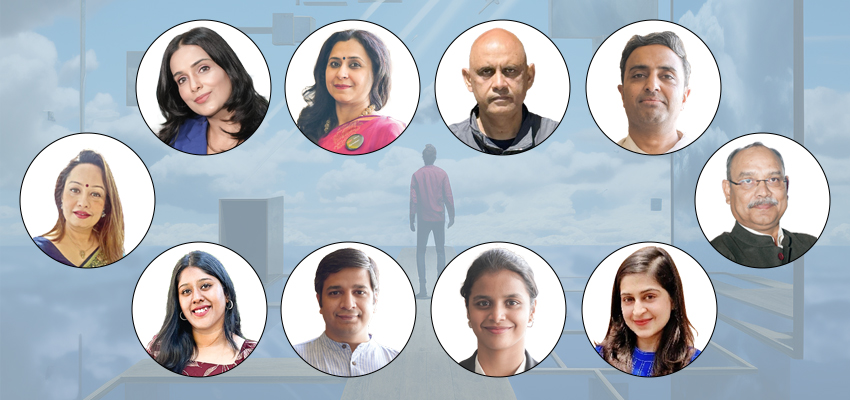
As our daily lives get increasingly mediated by technology and AI, almost everything feels like magic and soon it would be difficult to distinguish between reality and illusion. Now is the time to talk in terms of "What if" so that we may entertain all possibilities that await us in the near future. To find out if we will have any semblance of control in our lives, TEDx with Sri Balaji University, Pune (SBUP), independently organised a TEDx event recently at the SBUP campus in Pune, wherein inspiring speakers enlightened the audience with their eye-opening ideas. Corporate Citizen brings you exclusive interviews with these inspiring speakers
Hunger for knowledge AND SUCCESS
In her 20+ years corporate career, Saumya Badgayan, Dual PhD holder, Vice-President, HR Business Strategy, Gold Star Jewellery Pvt. Ltd., has a vast experience in the field of sales, marketing, corporate strategy and HR. She is a keynote speaker on 250+ platforms, NASSCOM and SkillsHACK mentor, YouTube creator as well as a Professor of Practice at Woxsen University, Hyderabad and Lovely Professional University, Punjab, and a visiting faculty at iFEEL, Lonavala. In a conversation with Corporate Citizen, she spoke about her academic and professional life, challenges in HR field, her views about Gen Z’s and much more
-By Siddharth Gaikwad
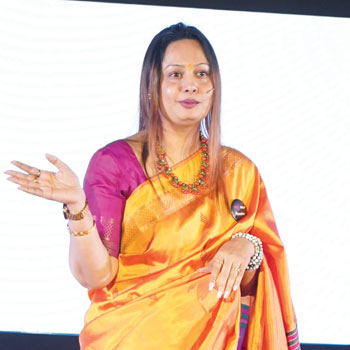
Corporate Citizen:You started your career in the sales field. How did you transition into a successful career in HR field?
Saumya Badgayan: I have secured a gold medal in HR and MBA degree in sales marketing and international trade. Hence I understand both sides of the spectrum. I began my career in sales field because there is more money, incentives and pleasure in it. However, due to personal reasons, I was thinking of leaving sales and fortunately, in the same company I was selected to join as the head of HR department. And, that’s how my HR journey started.
CC: Can you share some challenges you faced while working in the HR field?
Challenges in HR field would come for people who don’t understand the business. I always tell people that the business of HR is business. The moment you understand your business, HR is a smooth function. Most of the time HR professionals who would be walking in for interviews, I found were very data averse. They said that they don’t like Mathematics so did not take up finance and sales. They selected HR which is easy. But life is not between two punches and one lunch culture, it’s beyond that. I am also now an industrial psychologist. Staying agile with an empathetic bent of mind works the best and helps me navigate tricky situations.
CC: What new challenges you expect will occur in the HR field in next decade?
AI will not take away your jobs. Technology will be complimentary to a human being because human brains are the ones who have created the technology. So, one cannot replace the other. However, the mundane repetitive jobs, which require less intellect will be taken away by technology.
CC: Retaining Gen Z’s in the workforce is difficult as they indulge in quiet quitting and changing jobs. How do you face it?
Gen Zs are too fast and too quick but everything does not occur in two minutes, neither your food nor your career. You have to brew in the system.
Now, loud resignations have also started along with quiet quitting. They do not understand that everyone cannot be an Instagrammer or a Youtuber. You need to understand its technology and content creation. You need to have attention to the details. Quick fix solution will not always solve the problem.
Gen Z’s are great teachers. If you bring them onboard, join hands with them, then there is no one better than them who can teach you the latest in technology. They are good friends. However, one needs to understand how to create that cohesive and collaborative culture.
CC: Mental health has become very important in this fast-paced life. So, how do you motivate people to have good mental health?
Young people joining their jobs must approach, tell their problems and seek support from their seniors. Learn to say no, with my disclaimer that it must be for the right reasons.
One of the most interesting things is creating an urgent important matrix. Create four compartments. Put what is urgent and important in one compartment. Put what is urgent and not important in second compartment. Put what is not important but urgent in third compartment. Put what is not important and not urgent in fourth compartment. This is a simple trick to sort your day’s work.
CC: What advice would you give to MBA students to excel in their studies and future career?
MBA is just not another degree. It is more than a curriculum. It is about getting insight of the corporate world. Your professors will be demanding more efforts for excelling academically because they are preparing you to face the corporate world. Give your best and succeed in life. We would love to see you very high up in the echelons.
CC: Learning, unlearning and relearning is a constant process. So,what will you advise the MBA students about it?
I am a knowledge sponge. I am a student for life. At this age, I have completed my MA in psychology because I am very inquisitive. Behaviours and their patterns have always intrigued me to a larger extent and hence I did my MA in psychology. It is also helping me in analysing human patterns. I obtained my first PhD in 2018 and second PhD in 2025. So learning, unlearning and relearning is important. One needs to have an inquisitiveness for what is next. In the corporate world, we live it. Here, what IS next is what is YOUR next.
To build a purpose, to take a stand”CC: What is your success mantra of life?
Success mantra of life is just stay hungry, stay curious. Steve Jobs has said, “Stay hungry. Stay Foolish.” Today, also I ask questions with great inquisitiveness. I have been teaching in B-schools since 2012. The students have been reverse mentoring me for a lot of things. It has helped me to keep up with the next generation.
FAITH, FORTITUDE AND DIVINE TEST
This story is all about endurance. Endurance on whatever challenges that God threw and the mankind finding its purpose.
So, this story is of a girl, convent educated, belonging to an erudite family, life full of abundance. Hailing from a small town of Jabalpur, Madhya Pradesh, she was always exposed to the business world. When she was in Std VIII, she penned down in her personal diary “I want to be a corporate leader and do an MBA”.
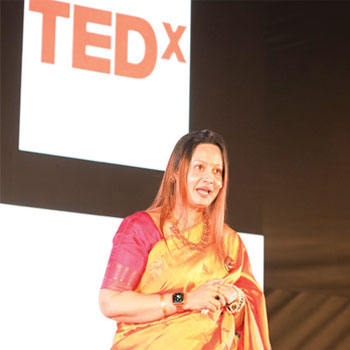
The bright girl, after completing her graduation, expressed her wish to pursue MBA. But, her family was against it. They wanted her to pursue M.Sc and immediately get married after that. But, with her mother’s support, the girl appeared for CAT examination. She not only cracked it, but also she topped the state. The culmination of her MBA came with her engagement to a Chartered Accountant from Mumbai.
Post her marriage, she began her corporate career with one of the largest jewellery manufacturing companies. At that time, the girl was fighting two battles simultaneously. As a new mother, she was fighting for her place in the office, and as a wife, she was fulfilling her responsibility towards her husband, who was enduring cancer treatment. Juggling between taking care of her six-month old daughter, visiting the hospital for her husband’s chemo therapy sessions and living her dream job— she aced all her roles.
Time moved on, and soon the top management noticed her talent. Her achievements antagonised people, and out of the blue she was dismissed from the company without any explanation. The incident broke her, and to take her out of grief, her husband who had won the battle with cancer, took her for a vacation. Little did she know that this would be the last vacation with her husband. He got the cancer symptoms back and after multiple surgeries, chemo sessions for two long months, she lost him, leaving her with their nine-year-old daughter. At a point of time, the girl met God in the physical form, God who not only embraced her, her daughter and her family, but embraced all of what was broken. This God was also a broken soul. Together they built a family, they built each other and they built careers.
This girl was me and this is my story. After going through all this trauma, life did not stop for me. I completed my MA in psychology. I did my second PhD. My daughter is also doing wonderfully well. To conclude, I would say:
“When God does challenge, the storm may rise. To darken the path before our eyes. Yet the man must strive, with heart and hand
Patience and PROGRESS
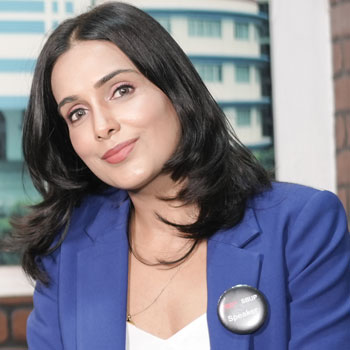
"A true leader in the world of marketing with 20 years of experience, Archana Dhankar, senior director, marketing-global demand and social media at Sutherland, exclusively talks to Corporate Citizen, sharing her experience in leading global teams to success, her expertise in influencer marketing and her creative pursuits as a blogger, content creator and writer"
-By Anushree Bhoware
Corporate Citizen: What inspire d your journey in marketing and how it has evolved over the years?
Archana Dhankar: As a student I was always very creative. In my school, I’ve been in more creative activities along with academics, be it dance or painting, and I thought that’s why marketing is what excited me. A lot of perceptions about marketing is that it’s like creative arts, but it’s not. Today, marketing is a lot more data-oriented and my engineering background helped me with that. Which is why I started working in digital marketing, where it’s more about data and how we are using data to deliver campaigns, execution and awareness to brands. I have also worked with tech organisations because I understand the layer of tech, due to my career background. So, I’m enjoying it and I hope that I’m able to work even better in future years.
CC: What challenges do you face managing global teams and how do you tackle them?
The world has moved to a place where global teams are the new norm. People are no more coming to the offices every day. Even if you’re living in the same city or in the same country, you’re still working remotely a lot of times. Collaboration and understanding the need for communication when folks are remote are now lot more important, and that is what I do. I focus a on collaboration and communication with the team.
The other thing that has really helped me along the way is to make sure that we help the team understand the purpose of what they’re doing and why. If you understand the why and the reason of what you’re delivering, and what it will solve, it’s much easier to deliver on those lines.
CC: What motivates you to keep pushing boundaries in the field of marketing?
I did an exercise when I was doing my MBA, which was about ‘what are your core values?’ One of my core values that came out was growth and learning. So, for me I have the growth mindset of always be learning and always be growing, which means that I want to do better to be able to deliver better marketing campaigns, do better with my job, with my profile and my career.
CC: Share a memorable lesson you have learned from a mistake early in your career journey?
Be patient—people who know me from close would tell that I am not a patient person. I am very impatient and I want the results really fast. So being patient is one lesson I am still learning, and I keep reminding myself of. Things will happen when they are supposed to happen; you need to put in your work and things will happen. If you keep chasing goals, sometimes it becomes very materialistic. So, enjoy the process and be patient.
CC: What’s a hobby or interest outside of work that surprises people about you?
Let me share something I have discovered recently. I’ve been on a journey of fitness, and since 2021 I’ve found a love and passion for Yoga. And, I have seen a lot of positive impact on my mental strength and creativity from having something fun and enriching outside work.
CC: What marketing lessons you want to share with management students who are going to enter in this corporate sector?
Marketing is no longer just about selling a product; it’s about creating value, building relationships, and staying ahead in a constantly evolving landscape. For management students entering the corporate world, the most important lesson is to adopt a customer-first mindset— understanding their needs, behaviours and pain points, is key to crafting successful marketing strategies. Additionally, datadriven decision-making is non-negotiable. With AI, analytics and automation shaping the future, relying solely on gut instinct is no longer enough. Marketers who master storytelling and personalisation will have a competitive edge, as consumers engage with brands that resonate with their emotions and experiences. Lastly, marketing is a field that never stands still—continuous learning, whether in digital tools, consumer psychology, or emerging trends, is what will future-proof a marketer’s career. The key to success is to stay curious, adaptable, and always focused on delivering value.
CC: Given your hectic schedule as a Senior Director of Marketing, how do you manage to unwind yourself?
When you have busy day, you need something to decompress you, something which opens up your mind. So, for me cooking and exercise are those two things. If I’m stressed I will either cook a really nice food or I would go to the gym, having just one hour of ‘me time’ exercising and listening to the music that I want to. And, that’s how I decompress.
PIONEERING THE FUTURE
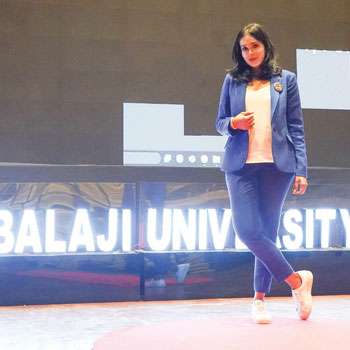
India is touted to be one of the places, where lot of organisations will come for AI talent. The pace of change is very fast and to tackle this change, you need to learn technical skills, soft skills, transferable skills, and ethical understanding. Also, you need to have an understanding of data and the ability of knowing different places where AI will actually make a bigger impact. Data is the backbone of AI. Every three months, AI gets outdated. Somebody at the back is still fixing that, removing bias within the data, making sure data is actually going in the right form within AI as well. So, the skill that you need to have is the understanding of what is right and wrong—the soft skills. The attitude towards continuous learning is more important. I believe in learning every day and developing these skills is really important.
We have to be mindful of deepfakes. DPD firm had their chatbot go crazy, talking about bad reputation on the brand itself. So, you have to have human plus AI, when you’re implementing AI. And, here the most important is being authentic.
There was a popular brand that actually created a generative image of their experience—Willy Wonka. It was providing real experience, which was nowhere near to what they were selling. We can’t generate and sell things that don’t exist. So, while we are using and implementing AI, we need to also be aware of the considerations. AI should be used for good. We see sometimes, it’s being used for bad and there are also a lot of organisational concerns around this. So, my takeaway here is that AI is efficient, it’s effective, get on board, but just be mindful of how you are using it and be very attentive of brand reputation.
Artificial Intelligence is not going to take your jobs, it is there to stay, but somebody who is using AI will actually take your job away. Roles might change in their shape and form, but they are here to stay and you have to evolve with those.
HR transformation LEADER
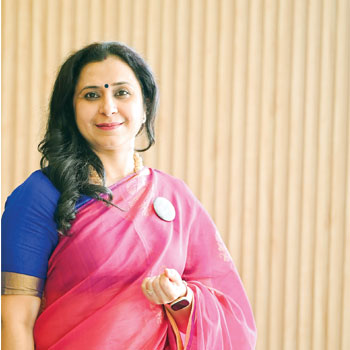
"A strategic HR executive, Veena Chugh, CEO, Arthaa Advisors, helps businesses achieve their goals, and leverages her business acumen and influencing skills to empower employee potential and create thriving workplaces. A global HR transformation leader, Veena has also authored “A Pink Rose: And Other Short Stories”, a collection of 16 short stories based on reflections on life. She talks to Corporate Citizen about her career journey, experiences, and transformational thoughts on human resources management"
-By Rajesh Rao
Corporate Citizen: With AI and HR tech coming in, will HR remain the same? What human elements will remain in human resources?
Veena Chugh: We’re at a critical inflection point where we collectively determine how HR evolves alongside AI. This isn’t something HR can navigate alone—we need a collaborative approach involving corporate leadership, governance bodies and local representatives. The integration of AI will touch every aspect of our business lives, so we need to establish cross-functional teams that can assess not just which HR functions to automate, but understand the ripple effects across IT, sales and operations. By forming diverse teams with representation from all stakeholders, we can more effectively navigate this transformational period.
CC: How can HR blend strategic insight with human resource management to drive initiatives, directly aligning with the company’s business objectives?
I’ve worked with two companies where I directly reported to the organisation’s CEO. As an HR head or a leader for an organisation, you need to be in sync with what is the direction of the organisation. I would spend a lot of time with the CEO, to understand what vision he has for the company, what he foresees and what are his pain points. What are his expectations from me in the next 90 days or how does he foresee it for a year? If we are thinking of an HR strategy for a company, it needs to be aligned with the business strategy and HR people need to be more sensitive and understand more about the business. Understand the next 3-5-10 years’ goals the business is envisioning for themselves and then, work hand-in-hand with the management to build HR strategy.
CC: How would you mentor Gen Z to take on leadership roles and incorporate them into a succession plan?
The key challenge I’ve observed with millennials was over-promising and under-delivering. With Gen Z, there’s a communication gap as millennials move into leadership roles. The smartphone generation expects everything to be instantaneous— including career advancement. Building strong communication channels is essential. We need to clearly articulate expectations while also listening to what excites this generation. Identify your high-potential Gen Z talent and create meaningful development opportunities that align with their aspirations. If those opportunities don’t exist in your organisation, be prepared to let them go. Open dialogue is crucial because there’s a significant generational disconnect in today’s workforce that often goes unaddressed.
CC: As HR continues to help businesses move forward, what are the biggest challenges that HR management faces today in this post-pandemic and AI world?
The human element remains irreplaceable in HR. While AI can handle repetitive, system-driven processes like onboarding documentation, it cannot replace the human connection needed for sensitive conversations around performance improvement or career development. AI excels at technical skills training but falls short of soft skills development. The challenge is determining which aspects of HR to automate and which require a human touch. Effective counselling, mentoring, and navigating complex interpersonal dynamics—these are areas where human HR professionals will continue to provide unique value.
CC: You have authored the book “A Pink Rose: And Other Short Stories”, a collection of 16 short stories based on reflections on life—what is the message you are giving out to the readers through these reflections?
These stories are works of fiction—portraits of imaginary events and people that nonetheless capture authentic emotional truths. Many of the narratives in this collection are deeply reflective, inviting readers to contemplate the idea that regardless of past mistakes, there’s always the possibility of a new beginning. The underlying message is that personal growth requires honest self-acknowledgment - you must recognise your actions, accept their consequences, and commit to meaningful change going forward. I wanted to explore how human resilience allows us to face our flaws, learn from difficult experiences, and ultimately transform our lives through conscious choice and determination.
MODERN DAY MAYA: ILLUSION
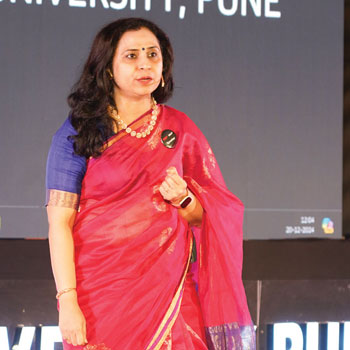
Did you know that suicide is the second leading cause of death for people aged 15 to 29 years? Nearly 8,00,000 people die by suicide every year and millions of young people are fighting this invisible battle against suicide every single day.
Imagine a moment so heavy it determines if you live or die. For me that moment came on a balcony, I was 19, barefoot, tired and my mind is storm of voices “You won’t make it. You are not good enough. Dying is better than living”. These are fleeting thoughts for me—they are absolute truths. And then, there is some miracle that happened. I slowly step away. It’s a very emotional moment for me and my heart starts sinking. I start thinking that what’s going to happen to my family. Papa calls me Jhansi ki Rani and my mom sees me as a pillar of strength. And, I think of the pain that I have caused them and that pain makes me step away. Its not courage that saves me tonight, it’s the fear of causing more pain that I was trying to escape.
What is this? This is Maya, it’s the illusion. Depression to me is a modern day Maya. It’s the relentless illusion that traps us into stories and makes us believe in these stories and we feel that they are real.
I step away. Then one day when I cannot contain the voices in my head, out of anguish I grab a sheet of paper and pen, and start writing. And, I put out all my feelings in that paper. I feel much better, without realising now I start writing often. Writing has become my sanctuary, a place where I pour out my feelings without any judgement.
So, next time when life brings you to the edge, take a step back, grab a pen and start writing your story. Depression took me to the edge, but it also gave a gift that I will treasure forever—the gift of writing.
A Journey Beyond BORDERS
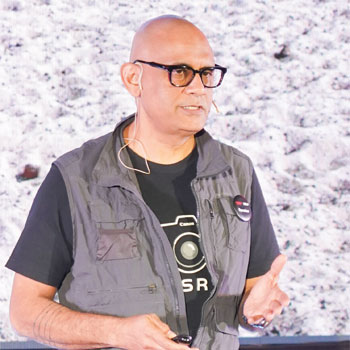
"An independent photographer, storyteller and traveller, Capt. Navtej Singh (retd.) also has a remarkable 32-year career in the Indian Navy. What began as an attempt to manage the Navy’s publicity efforts turned into a lifelong love for capturing the world through his lens. Today, he travels far and wide, documenting diverse cultures and vanishing communities, preserving their stories before they fade away. Talking to Corporate Citizen, he shares his experiences, insights, and the valuable lessons he has learned throughout his journey from serving in the Indian Navy to becoming a photographer and storyteller "
-By Aryan Agarwal
Corporate Citizen: Your journey has taken you from being a Navy officer to a photographer. How did that transition take place?
Capt. Navtej Singh: Around 15- 16 years ago, during my time in the Navy, I was placed in a department where I had to manage publicity for the force. As Navy officers, we are trained to adapt to any job assigned to us. And, I realised that good videos and photographs were hard to come by. That’s when I bought a DSLR camera and tried my hand at photography. The photographs turned out fairly well, and over time, I honed my skills. Gradually, I began taking more photographs, so I wouldn’t exactly call it a transition. My career in Navy played a significant role in helping me develop my skills as a photographer, supporting me in every way to enhance them.
Eventually, I reached a point where I felt the need to explore and travel independently. That’s when I decided to take premature retirement from the Navy, allowing me to document various places and cultures— something that would have been challenging while still in service.
CC: What kind of places or people do you like to document?
I document anything that is photo-worthy, anything that catches my eye. I see the world in frames, and whatever pleases my senses becomes my subject. So, I can never say that I’m only inclined toward portraits or landscapes. I photograph anything that resonates with my soul and brings me joy.
CC: A huge part of your work includes documenting vanishing communities—those that are not in the mainstream media. Why do you think the stories of these communities are important?
I began my photography journey around 15-16 years ago, but I didn’t start documenting vanishing communities until about 10 years ago because I wasn’t even aware of their existence. With the advent of modern technology and the growing reach of media, television and mobile phones, everything is changing rapidly. Life has become much easier compared to before. Why should the ‘Changpas’ for instance, continue living in harsh environments where temperatures drop to minus 15 degrees? They would rather move to Leh, where the climate is more bearable and modern conveniences like water and electricity are readily available.
Media and technology have revolutionised how people live. Now, I’m not saying education is bad—it’s absolutely necessary, but with education, people begin to realise there are easier ways to earn a living. Take a herder, for instance. Even if he owns a herd of 500 sheep, how much can he earn? Maybe a lakh to two lakh rupees, on an average in a month. Meanwhile, his educated child can pursue a far easier life, eventually earning more money with much less effort, compared to a herder’s job. As a result, no one wants to stick to traditional vocations.
People are choosing to move out and embrace a simpler, more modern lifestyle. Even the remotest villages in the country now have Wi-Fi, 4G, or even 5G connections, and people are connected through mobile phones. They see an easier, more glamorous and colourful life, outside their traditional boundaries, and naturally they want to move towards it. This is why these communities are vanishing, and I believe it’s essential to document their stories before they disappear entirely.
CC: In this situation, is there a way to stop the younger generation of vanishing communities from migrating to cities?
How can you stop this? How do you even know what your forefathers did? We are no one to stop it. The only possible way might be to provide them with better remuneration and an improved quality of life, making it as attractive as moving to a city. However, I don’t see that happening in India anymore. It’s nearly impossible.
CC: As someone who has transitioned from the armed forces to a creative field like photography, what do you think is the importance of creativity?
Creativity is different for everyone. Cooking in the kitchen is creativity. Painting a house is creativity. Gardening is creativity. Everything can be a form of creativity. It’s about what arouses your senses and makes you feel alive. Creativity helps you feel connected to so many. It allows you to organise the disorganised and bring something meaningful out of it. It’s a way for your mind to work positively and create something beautiful from what others might overlook.
CC: From your journey, what is that one experience or learning you would like to share with the audience? Or any one moment in your life that you would never forget?
When it comes to one key learning, it is - you can only be successful in any endeavour if you are truly passionate about it. You need to dream about it, think about it, and live it—that’s the only way to succeed. If you ask me about cameras, I’ll admit I know nothing technical about them. I know photographers who are brilliant with the technical aspects, yet they might not be as exceptional at taking photographs. For me, when I have a camera in hand, I’m completely possessed by it. That passion is what makes the difference.
As for unforgettable moments, there are countless. I’ve clicked photos from various platforms at sea and in the air. I’ve been in some of the toughest conditions—standing at the forecastle of a ship with waves crashing over me, while taking pictures. I’ve hung out of aeroplanes, with someone holding onto my trousers, without a harness, just to capture that one perfect shot. I’ve photographed tribes, sat with them, conversed with them, eaten their food, and shared their lives. These are the memories I carry with me.
I always tell people that the photographs I show them are two-dimensional—they only have length and breadth. But for me, those photographs carry hundreds of dimensions. They include my emotions, the weather at the time, the smells, the sounds, and so much more that can’t be shown to anyone. Whenever I click a photograph, I initially don’t like it. It feels like I’ve taken just a dot out of a massive canvas. What I show is that small portion, while the full scene is actually phenomenal. But when I revisit those photographs after two or three months, I often realise, “Wow, this is brilliant.” At least I managed to capture a small piece of something much larger.
LENS AND LIGHTS: EXTRAORDINARILY ORDINARY LIVES
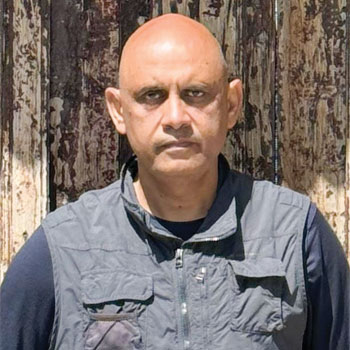
Imagine a world untouched by apps, Wi-Fi signals, or the fast-paced city life—a world where existence is defined by the rising Sun, grazing animals, and vast, uncharted horizons. Over the years, my camera has given me the privilege of witnessing lives that redefine resilience—lives often hidden away in the remote corners of our country.
Through this talk, I want to take you on a journey into these extraordinary lives that many might overlook as ordinary. From the high-altitude plains of Ladakh to the endless sands of the Thar Desert, I have immersed myself in the stories of communities like the ‘Changpas’ and ‘Rabaris’. These communities have taught me more about humanity, sustainability and coexistence than any textbook ever could.
Without even realising it, they live by principles that could inspire modern solutions for environmental conservation and social well-being. The theme of my talk, ‘Lens and Extraordinary Lives’, explores how these communities exist in harmony with their surroundings, balancing survival with stewardship— reminding us of lessons we may have forgotten over time.
Having documented most of India, from East to West and North to South, I have encountered countless unique stories.
Growing through CHALLENGES
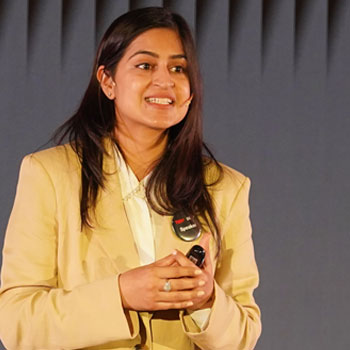
"As a distinguished management trainer, Navita Arora Khanna, who is also a behavioural skills expert, leverages her skills and experience to empower and inspire her clients and trainees, helping them achieve their personal and professional goals. She talks to Corporate Citizen on her personal and professional journey"
-By Anushree Bhoware
Corporate Citizen: Take us through your career journey— from working with banks to pursuing law, to landing in the skills training profession.
Navita Arora: When I started m y c a r e e r i n corporate training, the experience was wonderful. I took many courses. I worked with Axis Bank, then pursued a law degree and a course in the French language, while running my own institute. I am very interested in Neuro-Linguistic Programming (NLP). The game changed when I was invited by a company in Singapore, and from there I realised that there is no alternative to knowledge. If you have knowledge and are willing to work hard, you will get noticed. Your hard work will never go to waste. People will identify you based on your skills, not where you are from. Initially, I used to believe that being in Ujjain was holding me back from growing in life. But, I now understand that unless we put in the effort and work hard, we will only find excuses and blame our circumstances—in my case, my city. Once I understood this, I decided to work hard, and since then I have been doing just that. Now, I don’t think about which city I live in. I am comfortable in travelling wherever I get projects, and thankfully, my family supports me. So, I can fly wherever I need to, and that is the best part.
CC: What has been a pivotal moment in your life that shaped your perspective on work and leadership?
I would say the Covid-19 pandemic. Before Covid-19, I was running an institute in my city, Ujjain. I am married and settled in Ujjain, Madhya Pradesh, which is a small city. During the pandemic, when nothing was working, I realised that maybe I should try something else. That’s when I thought about corporate training.
CC: How has your hometown shaped the person you are today?
I believe everyone has their share of good and bad experiences. I wouldn’t call them bad experiences—rather life lessons. Through these experiences, I’ve learned that it’s important to focus on the right things that help you grow. Many of us often complain about being busy, but it’s crucial to evaluate what is keeping us busy. If certain things do not contribute to our growth yet consume all our time, we are merely wasting it.
CC: What does a typical day look like for you while balancing leadership and personal time?
Well, I’m a freelancer, so I don’t have a fixed daily routine. Whenever I have work, I am super busy. Otherwise, I spend time with my family and my two kids. It’s a very normal life—teaching them and managing household responsibilities. But, when it comes to work, I don’t look at the clock. I study, read as much as I can, and prepare thoroughly for my projects. I take my work very seriously. Whenever I have free time, I teach my kids in advance so that when I get big projects, I can fully focus on them. At the end of the day, it’s all about planning.
CC: If you could give your younger self one piece of advice, what would it be?
Focus, focus, and focus—there is no alternative. I was always very ambitious. I worked with Axis Bank, but after getting married, I took things lightly and took a break from my job without realising how much it would impact me.
While I continued working in Ujjain for 10 years, I felt something was missing. When I entered the world of corporate training, everything changed for me. Now, I realise what I had been missing all along. Through this experience, I have learned that you must be very clear about your goals. You need to distinguish between what is negotiable and what is non-negotiable in life. Often, we don’t take the most important things seriously. It is crucial to focus on what truly matters.
CC: What is something most people don’t know about you outside of work?
I love watching comedy dramas. I enjoy comedy, painting and writing as well.
CC: What skills do you nurture to train your students optimally?
With time what I have realised is one needs to be a very keen observer. When you observe things around you differently—tones, body language, different facets and aspects, you start learning a lot of things. And, when I started learning these things, I made sure that I do a lot of certificate courses as well to give more credibility to my profile. Whatever I have learned till now, I try and practice those things in real life when I communicate with people. So, it makes things interesting. I always test whatever techniques I learn online, whether these things work offline or not. And, I try and share the same set of knowledge wherever I train, with my trainees.
EMBRACING MINIMALISM IN MOTIVATION
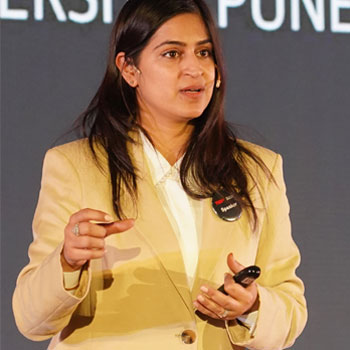
Imagine your perfect life, what do you see? Is it luxury cars, a dream vacation or happiness. Now, whatever you imagined, is it your dream life or is it because of people and external factors around you? Around 98 per cent of the thoughts and behavioural patterns do not belong to us. They belong to people around us. So, we are just two per cent—that is the per cent of originality we all have. Now, how to reclaim this two per cent? We all are bombarded from all sides. Everybody is pulling us in different directions. So, how conscious you want to be in life, it all depends on you.
One thing is sensory manipulation. Most of us, we believe that social media is a villain because we are unable to focus and we are always distracted. But, that is not true, social media is not a villain because it only triggers or enhances what we have in us. Let me bring out something very interesting, motivational content on the internet. All of us read motivational books, self-help books, watch YouTube shorts and reels related to motivation and share it with our friends. But what is actually happening here, we are stuck in a loop of watching the videos. What is the sense of watching motivational content when it is not pushing you to move, rather it is pushing you to watch more videos back to back? Thus, inspiration without implementation is useless. From now on, whenever you watch any motivational content make sure you take action.
Another very interesting thing I want to talk about is failures—we are always scared of them. The society has put in our head that it is bad to fail, you cannot fail. However, it is okay to make mistakes, it is okay to fail in life, what is not okay is to not stand up again, to not learn, to not evolve. If you’re not good at something, please try and evolve, refine yourself.
One more thing I’d like to bring up is, the privilege. Those who are super-duper privileged about situations in life, they will not know the real essence of success. Life is not a joy ride from success to success, it is a journey from success to failures. It is those days of pain, hardships and struggles, which makes success more valuable. First of all, we think that our thought process or our views are ours, but they are not. Secondly, think twice before getting influenced by the external factors. You define your own life, don’t let society define your career goals and your definition of happiness. Don’t be scared to fail, wear your failure like a badge on your shoulder. Life is about becoming wiser, more resilient with time and these challenging experiences make us who we are today.
Now, what is a solution to reclaim that two per cent. First of all, never bother about external validation. Secondly, do not think what others are thinking about you. Another interesting solution I would like to suggest is, minimalism and sustainability. Minimalism is not about having fewer things in life, it is not just connected with physical possessions, it is also about thoughts. Declutter your thoughts because when you declutter, you create extra mental space. Only then we can reclaim this two per cent.
Endless EXPLORATION
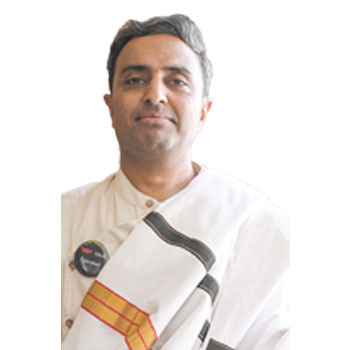
"“I have no special talents. I am only passionately curious”, this quote by Albert Einstein, captures the essence of Janardhan Nanjundan’s journey, as an educator, environmentalist, researcher and explorer. For over 20-plus years, he has been fiercely passionate about everything he does and has approached each of his professions with a childlike curiousness. Janardhan is also a stubborn climate optimist, a National Geographic Certified educator, a NASA citizen scientist and founder and Convenor, Nilgiri Needs Love. In tête-à-tête with Corporate Citizen, he takes us through his journey of endless exploration and his amazingly diverse field of work in education, environment and empowerment "
-By Rajesh Rao
Corporate Citizen: Does curiosity drive the career paths you have chosen over the 20 years of your journey?
Janardhan Nanjundan: Yes, Curiosity is everythingchild-like-curiosity is what drives me. My curiosities lead me to pursue a course in Indian Institute of Management, Kozhikode, my curiosities lead me to pursue Neuroscience from HarvardX, my curiosities earned me National Geographic Certified Educator, School Innovation Ambassador, NASA TOPS Scholar and my curiosities made me a NASA Citizen Scientist. Your curiosity to know new things will help you reach new heights. Example, climbing Mount Everest, is difficult and requires a lot of mountaineering training and money. But, if you are really curious and want to know what is there on the top of the mountain and experience it, your curiosity will prepare you to cross any hurdles—you can seek sponsorship, partnership, collaboration or convert climbing Mount Everest a citizen science project. The possibilities are many.
CC: How has your qualities of childlike curiosity and fierce passion stood in good stead throughout your life?
I was very curious right from my childhood—wanting to know about anything and everything. Now, as an adult I have the same curiosity, but with a purpose. My purpose now is, how I can contribute using my curiosity, to issues like climate change and environmental challenges, and find solutions to those issues. This is how I have taken my curiosity to the next level-curiosity with a purpose.
I belong to the indigenous Badaga community, an ethno-linguistic community living in the Nilgiri district in Tamil Nadu, India. We live in harmony with the 6-7 indigenous communities and others. We are closely connected with nature and for us nature is everything. I am now inquisitive to know how traditional knowledge has helped the indigenous communities to thrive for over thousands of years, overcoming climate change, and try to implement the same in the current climate crisis.
CC: Are you working to connect the younger generation with nature, teaching them the value of nature?
That is one of my main initiative, the younger generations are disconnected from nature. As part of the initiatives, I create awareness on ecology, biodiversity and climate change. I also conduct outdoor eco-trips and let the younger generation I work with, to mingle with nature. They are always confined within the four-walled rooms and for a change we give them this experience of being under the open sky and nature. Learning can happen everywhere, and there are physical, emotional and psychological benefits for teaching in the natural world.
CC: We are losing our nature-connected traditional and tribal rituals and practices. How can we preserve these practices?
Over thousands of years, indigenous people around the world have lived in harmony with nature, accepted its supremacy, learned through trial, error and observation, and developed vast and varied knowledge systems in areas like fire making, water conservation, medicine, arts and crafts, farming, etc—stored in the memories of elders, and passed on to the next generations through stories, legends, folklore, and through rituals and beliefs. Today, there is a disconnect between culture and nature. People don’t know why they are performing these rituals and customs, their intended cultural values are forgotten and their ecological relevance is ignored. Rituals are not necessarily religious practices, they are part of everyday life.
Rituals and customs are not merely events; they are mechanisms to preserve, practice and pass-on the knowledge to the next generation. Each of our rituals, traditions, customs that we practice, are strings that goes into making our social fabric, and it has to be bound together to keep it intact. By teaching the logic behind these rituals and beliefs, we can try preserving them.
CC: You are playing multiple roles of an educator, explorer, ecologist, instructor in diverse fields. What drives you to play these multiple roles?
It’s my curiosity and passion that drives me. I am a lifelong learner. Every life has its own purpose to live. As human beings, we have an extra sense and our purpose of life also includes our urge to learn. So, if we stop learning, we will stop evolving. If you want to really live your life, you have to keep learning. Learning is not about just getting a degree from a college, you learn from anything and everything.
CC: How are you helping shift the narrative on climate change?
Initially, I was a climate advocate and would dictate what to do and what not to do. But now I’m a Climate Optimist, where I put forth the positive RITUALS, BELIEFS AND LOST LOGIC side, that change can happen and it is not too late. As an educator, I want to inspire change. The next generation should understand the science behind the climate change. For example, we always blame Carbon dioxide (Co2) and always give negative impression about Carbon dioxide gas. But, we also have to know that Carbon dioxide gas is essential, because trees and plants on this planet requires Carbon dioxide, as it is the carbon that they fix from the carbon dioxide during photosynthesis, which is then used for synthesising glucose. So, Co2 is good but today we have excess Co2 in our atmosphere, which is contributing to global warming. I tell the science behind it and inspire the next gen to innovate and come up with new ideas, wherein they can solve this problem. It is not just any government’s job, but it is everybody’s job to solve this problem.
RITUALS, BELIEFS AND LOST LOGIC
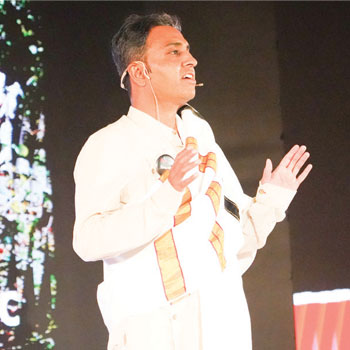
I come from a place called Nilgiris, part of the Western Ghats, a UNESCO World Heritage site and a biodiversity hotspot. It is home to lot of indigenous communities, including the Todas, Badagas, Kotas, Kurumbas and the Paniyas. I belong to the Badaga community, where rituals play a vital role.
I always wondered how do the indigenous communities find the age of someone, thousands of years ago when they had no knowledge about numbers and had no written scripts. How did the indigenous communities find water sources? How they made and maintained fire? Why all these indigenous communities build their temples on the mountain top? I found that the answer lies in the rituals they perform.
Indigenous communities are keen observers of nature. We have a flower called Neelakurinji, one of rarest flowers in the world, which blooms once every 12 years. Our community people would use this blooming period, to determine someone’s age. Witnessing one blooming indicated 12 years and two blooming indicated 24 years, and that’s how determining the age worked.
Another ritual, which we call it as Halla Paruva (Water offering) is when every year a set of people would go to the mountain top and worship water and till date it is practiced. However, earlier the intended purpose was not worshiping. Those days, the main source of water was the fresh water springs flowing from the mountain tops. And, every year they would ritualistically go to the mountain to not worship, but to remove the debris and clean the blockages, to get a continuous free flowing water. However, today the cleaning part is forgotten, and what is done is only worshiping. As a result, the streams are blocked with debris and there is hardly any water flowing down in streams. We now depend upon the piped water supplied by the municipal.
There is one more ritual called Doddamane, where you keep the lamp burning 24x7 in a house. Someone in the family will keep on feeding the lamp with oil to keep the lamp burning day and night. Today, it is considered as religious practice, but it had a logic behind the ritual. In old days, fire was essential for providing warmth, for cooking and for keeping the predators away. In those days, fire making was very difficult, taking around 20-30 minutes to make fire using bore-drill method. The burning lamp symbolised the utilisation of fire. Every year during the harvest festival we still perform this ritual of making fire.
Turning Setbacks INTO STRENGTH Turning Setbacks INTO STRENGTH
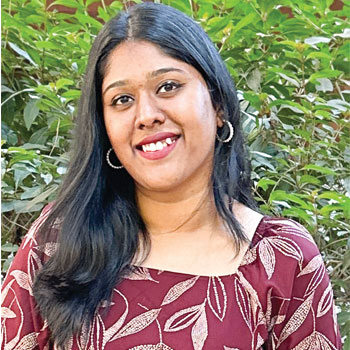
"An adventurous and enthusiastic individual, MBA aspirant Ayana George Varghese, loves learning new things with fun and energy. She firmly believes that “nothing is impossible,” and stepping out of her comfort zone has been a significant part of her journey. She is currently pursuing her MBA in International Business at the Balaji Institute of International Business (BIIB), SBUP. In a talk with Corporate Citizen, Ayana shares her insights, her journey and the valuable lessons she has learned along the way "
-By Aryan Agarwal
Corporate Citizen: You strongly believe in stepping out of your comfort zone. Why is that so?
Ayana Varghese: What I’ve learned throughout my life is that until and unless you step out of your comfort zone, you won’t achieve anything. You have to break out of that cocoon and put yourself out there, even if it means letting people judge you. People will always have thousands of things to say—if not about you, then about something else. It doesn’t matter. What matters is that you step out of your comfort zone. Believe me, once you do, you’ll see the whole staircase of success right in front of you.
CC: Life is all about ups and downs. How can one maintain a positive mindset during the downs?
It can be different for everyone. Personally, I believe there are countless perspectives out there, and I enjoy listening to people as much as I love talking because you learn something new every day. For me, I start by reminding myself that if I don’t stand up for myself, no one else will. That’s my mantra—believing that you only live once.
When you anticipate that something might go wrong, you’re already preparing yourself for it. I’ve realised that expecting failures more than happiness helps soften the blow. I used to be someone who expected so many good things, only to end up hurt and disappointed. So now, I choose to stay grounded in reality and live in the present moment, free from illusions.
You have to put yourself out there. If you confront failure, face it, learn from it, and then move on. I believe everything happens for a reason—it’s part of your destiny, meant to teach you something valuable. So, when failure comes, embrace it, rise above it, and keep moving forward.
CC: Would you like to share any life lessons you’ve learned the hard way?
I had dedicated two years of my life to preparing for NEET, but it turned out to be my biggest failure. I couldn’t even achieve 0.5% of my goal. Failing so badly was miserable, but what hurt even more was failing my parents’ expectations. Parents often get disappointed easily, and it’s something they’ve learned through generations—that if your parents expect something, you’re supposed to fulfill it. That failure was a turning point for me. It made me realise that, yes, I may disappoint people and their expectations, but I need to do something that truly makes me happy
The key is to believe that you can’t afford to disappoint yourself. People will always have rational and irrational expectations of you, and it’s impossible to meet them all. So, keep fighting and focus on doing what you’re meant to do.
CC: You also believe in the saying “Nothing is impossible.” Would you like to share any of your achievements that you attained through this mindset?
I have had the privilege of being a speaker in my former college, where I could share my experiences and thoughts. Becoming a public speaker has always been a dream of mine—to motivate thousands of people like me. That’s why I strongly believe in the idea that “nothing is impossible.” If someone else can do it, so can I. There are no barriers in life, and that mindset keeps me moving forward.
I live a very simple life, and I feel simplicity has its own way of guiding you. One of my biggest achievements is giving a TEDx talk, something I had dreamed of even before joining Sri Balaji University, Pune (SBUP). During our one-month induction period, we had several speakers who inspired us and taught us how to motivate ourselves and become public speakers. I vividly remember going to one of my teachers and asking, “How can I become a public speaker?” She simply said, “Believe in yourself.” That was the moment it all started.
I used to sit in the auditorium at SBUP and tell my friends, “One day, I’ll stand on that stage, take this memento back home, make my parents proud, and share my story.” Today, I’m on the top of the world, as I stood on that very stage and delivered my first TEDx talk. God made it happen for me.
CC: What’s one piece of advice you’d like to give to someone trying to come out of their comfort zone?
When you step out of your comfort zone, you will hear a lot of judgements. You will face struggles, and people will tell you that you can’t make it or that you won’t accomplish what you’re dreaming of. When I told my parents that I wanted to share my story on an international platform, their reaction was so typical that I couldn’t stop laughing. They asked, “How will you find a good guy to marry if you share your story publicly?” To which I said, “If he is the right guy, he would be super proud of me when he sees my achievement, and that’s when I’ll know he is a good guy. And, even if I don’t find the right guy at the right time, it’s fine—my story will motivate hundreds, and that’s what matters.” The rest is in God’s hands.
I strongly believe in God and destiny. Without the universe, there’s nothing we can do. Everything happens as it’s meant to. One thing I would always say is to be kind. People can be cruel, but if something wrong happens to you, it doesn’t mean you have to become a bad person.
BE YOUR OWN VOICE
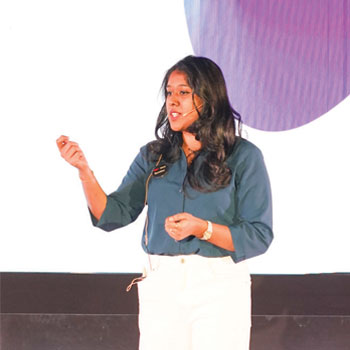
Pessimism leads to weakness, optimism to power-this quote by American philosopher, William James, perfectly defines the story of a little girl I know. A girl whose firm optimism helped her survive the unimaginable.
At just nine years of age, her carefree childhood was stolen by an immense illness. In December 2012, she was struck by a persistent fever that refused to subside. Her worried parents took her to a renowned hospital in Pune, but even after countless tests, doctors couldn’t identify the cause. Eventually, they suspected a chronic kidney disorder and insisted on immediate dialysis, warning that without it, she might not survive. Just imagine the horror her parents must have felt hearing this about their own child.
But they refused to accept this fate. Seeking another opinion, they travelled to a hospital in Tamil Nadu, where doctors finally diagnosed her with Nephrotic Syndrome—a chronic kidney disorder that causes excessive protein loss, swelling, fatigue, and severe mood swings. Soon, she underwent a painful biopsy and was placed on heavy steroids, causing her weight to surge to 85 kgs by the age of 13. Then came another blow—a severe gastric ulcer, leading to relentless vomiting of blood. Her friends distanced themselves, fearing her condition.
Yet, despite it all, she fought back. She remembered Charlie Chaplin’s words, “when you cannot laugh at the same joke again and again…then why do you cry again and again on the same worry?” She chose resilience over despair. Her parents prayed everywhere, breaking all religious barriers for their child. But in the end, it was her own mindset that saved her. That little girl was me.
Learnings, Leadership AND GROWTH
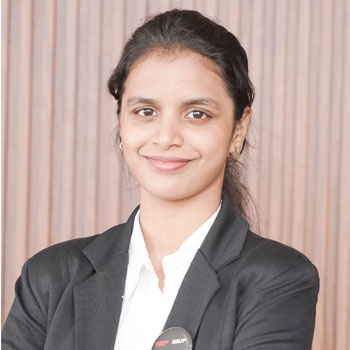
"Meet Ananya Kumar, an ambitious final-year student from Symbiosis School of Economics, pursuing Bachelor of Science (Hons.) in Economics, who is ready to make her mark in the corporate world. She is an accomplished author, youngest TEDx speaker, and an aspiring entrepreneur with a keen interest in finance, business, and social impact. She talks to Corporate Citizen, sharing her passion about leveraging innovation and research to improve the lives of those around her"
-By Anushree Bhoware
Corporate Citizen: What led your interest in management consulting and business intelligence?
Ananya Kumar : As for business intelligence, when I was in school, I just didn’t want to put all my energy into studying books and academics. I always used to look for extra courses or learn new skills. When I was in third semester of my college, there’s a software called Microsoft Power BI, which stands for Power Business Intelligence. So, I started learning that on platforms like YouTube and Coursera. I found it really cool and very relevant in the business world because we have had TED talks on AI and technology. It’s just very relevant from the automation part of it.
For management consulting, it happened when I was rejected to be a part of my consulting club, of which I’m the vice president currently. I was so curious that I started learning about consulting, not just for the sake of cracking the next club interview, but also to learn about it as a profession and I really liked it.
CC: What has been your biggest leadership lesson as Vice President of 180 Degrees Consulting?
As VP, I learned crucial leadership lessons. Navigating challenging team dynamics was the key. Working effectively when team members underperformed or when conflicts arose, was a challenge. This involved developing conflict resolution skills. Providing constructive feedback was essential. Motivating individuals in tough situations was important. Clear communication and realistic expectations were vital and fostering a supportive team environment was paramount.
CC: What economic policies do you think can drive greater financial inclusion in India?
India needs greater financial inclusion. Focus on financial literacy education within schools and communities is crucial. Simplifying complex financial products, especially for rural populations, is essential. Leveraging technology like mobile banking can bridge accessibility gaps. Digital literacy initiatives must accompany technological advancements. Supporting microfinance and self-help groups empowers marginalised communities.
CC: What role do you think innovation plays in shaping the future of business and economics?
Innovation fuels progress in business and economics. It creates new markets, improves efficiency, and solves complex problems. Technological advancements revolutionise industries. Novel business models disrupt traditional practices. Innovation drives competition and fosters a dynamic economy. It’s crucial for addressing global challenges like climate change and poverty, developing sustainable solutions and creating opportunities.
CC: What has been your most memorable public speaking experience?
My first TEDx talk in Hyderabad was incredibly memorable. The audience’s energy was palpable. Sharing ideas on such a prominent platform was rewarding. The subsequent conversations it sparked were invaluable. Preparing for the talk refined my communication skills. It allowed me to articulate thoughts with clarity and passion. The process solidified my belief in storytelling’s power.
CC: How was your experience while working with the start-ups?
Really nice. It accelerated my tiny will to have my own start-up in the future someday, because at the end of the day, I just want to have a means or a tool in which I can give back to society. I considered myself pretty blessed and privileged because the way I’ve been born and brought up, I would do so to do something for the people. And, I see start-up as that one tool to fulfil my objective of having my own start-up. However, the idea of my own venture was not the original one. Earlier, I thought of doing a job but as you meet with people in college or in events like TEDx, you network with them and your perspective changes.
CC: If you were to launch a startup today, what problem would you aim to solve?
I’d launch a startup addressing poverty and hunger through sustainable agriculture. A platform connecting smallholder farmers directly with consumers would be impactful. This model cuts intermediaries, reduces waste, and ensures fair prices. It also provides access to nutritious, affordable food. Educational initiatives on sustainable farming and nutrition would complement this.
CC: What motivated you to start minilibraries and reading spaces for NGOs in your hometown Lucknow?
My motivation stemmed from a belief in education’s transformative power. Access to books and learning environments is fundamental. These mini-libraries empower those little kids, particularly children. They provide tools to explore ideas, expand horizons, and break the cycle of poverty. This reflects my quest to contribute to education and create opportunities.
CC: Any parting words of encouragement for our readers who are looking to pursue their passions?
First of all, it’s totally okay if you feel lost, if you don’t feel at par with your matchmates. Selfdoubt happens a lot of time, especially when you’re in your late teens or in your early twenties.
About following your passion, one thing that I personally stick to is being disciplined. You have to be very disciplined because if you really want it, you have to work for it. Nothing happens by chance, you have to create your own luck and for that you have to work hard, polish yourself while being mindful of your mental and physical health.
Discipline and consistency is very important. You have to constantly talk to people, network with them, get their feedback about the field you want to work in. And, with time, reading, experimenting new things and trying out new ideas, will take your passion to new heights.
THE BURNT GLORY
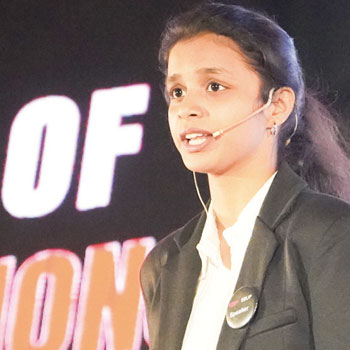
Today, busy-ness has become a badge of honour, but is it real success? We proudly wear this badge—having four hours of sleep, ten hours of work, 17 hours of workdays. Is it really productive or is it Maya (Illusion)? Now, burnout is not just about being tired, it is also about losing the value of what you do. You don’t find any satisfaction, just feel drenched, dissatisfied and everything bad, despite working so much. But, the reality is we still choose to ignore the evidence that overwork reduces your success. It hampers our attention span, it creates the probability to create more errors and of course it damages our mental and physical health.
Now, before we redefine productivity, we need to consider the cost of the illusions that we live in under the stress - burnout, reduced creativity, increased errors and even health risks. Simply because you think, you are being productive and contributing so much to your organisation, but it is at what cost? At the cost of your health.
I’m also about to enter the job market, and I do feel the related stress in my life. My days often get mixed up. I’m also constantly moving and keeping myself busy, and there comes a point when I also start mistaking my busy-ness with being productive.
Once one of my friends asked “When was the last time you truly felt proud of what you were doing?” Reflecting on that, I realised that I was mistaking my activities and my busy-ness for achievements. How much of what I was doing after college hours and at the hostel, was actually creating impact? Because, deep down I still felt dissatisfied and wasn’t really happy. That was one profound epiphany that I have had.
So, my challenge to you is, are you truly in control of your time, or are you trapped in an illusion of busy-ness and productivity?
Transforming Lives THROUGH MUSIC Transforming Lives THROUGH MUSIC
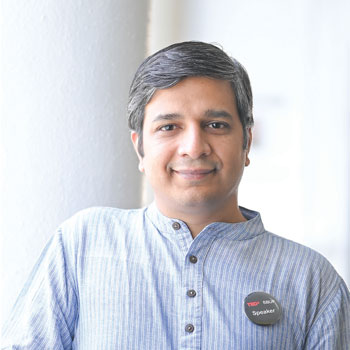
"In this competing and contending world where everyone is striving for success and money, Mandar Karanjkar, a communication consultant by profession, is striving to bring transformation in individuals and society through the power of music. With that aim, he cofounded Baithak Foundation, an NGO working to preserve and promote Indian classical music. Karanjkar has thoroughly studied Indian philosophy and Indian classical music, and has authored two books. He has also cofounded Seed Shower, a consulting firm operating in the domains of communication development and organisational culture. He talks to Corporate Citizen about his passionate efforts to bring transformation through music, strategic communication and more"
-By Rajesh Rao
Corporate Citizen: You did mechanical engineering, law and moved to writing, corporate communication and founded NGO to promote Indian classical music. Was it about enjoying greater professional development or to do what you are passionate about?
Mandar Karanjkar: I was fascinated by law and wanted to be a lawyer from a very early age, because my father worked as a judge in judiciary. But, I started with doing mechanical engineering, and later did law. I was good at engineering but I realised that this is not something I want to do for my entire life. Then I moved to writing, communications and now NGO. I had started a blog, for which I started interviewing famous musicians, industrialists and successful people.
Once while interviewing Naushad Forbes of Forbes Marshall, for my blog, he offered me the opportunity to blog for their company. I accepted his offer and that’s how I entered into communications landscape. I would write blogs, do content writing, search engine optimisation (SEO) for Forbes Marshall. I was also independently writing columns for newspapers. After a point, I realised that my true calling is music, and with my wife’s help, we started Baithak Foundation, an NGO, to work with children and see what music can bring into their lives. Later, I liked it so much that I quit my job with Forbes Marshall to devote my full time to Baithak Foundation. I also continued working as a communications consultant.
It was always about the urge to do what I want to do. It has not always necessarily led to increase in my earnings or professional development, but I have become happier every time I took the decision to change my work.
CC: You believe that music has power to transform individuals and society, which is why you started Baithak Foundation. How will the transformation come, in this competing and contending world, where everyone is striving for success and money?
I agree there is increasing cut-throat competition and comparison, and stress in people’s lives. As part of our NGO, we work with lot of schools in tier-1 and tier-2 cities, even in villages and tribal areas. What I have observed is that the mind-set is changing. Even in small villages we meet parents, who are confident and say that their kids can earn money anyway, but they should know how to spend that money and how to lead a meaningful life. So yes, still the majority is in the rat race, but what arts can do and music especially, it gives you the taste of peace, beauty and joy. Through our Baithak Foundation initiative, our effort is to give the children those moments of peace, beauty and joy.
CC: You also cofounded Seed Shower, a consulting firm operating in the domains of communication de velopment and organisational culture. Can you identify some key pillars of strategic communication that can significantly impact a start-up’s trajectory towards success?
Today, everyone is doing all kinds of activities related to communications, marketing and so on, just as a tick box exercise, because everyone is doing. They are posting on LinkedIn, writing blogs, creating podcasts. Companies end up spending lot of money, wasting a lot of time and creating lot of junk, which is useful for nobody. So, my advice is, take good amount of time to understand the problems your consumer or client are actually facing, and find how to solve that problems and what value can you add.
For example, in Baithak Foundation, we have a very simple value proposition—we believe that every child should have access to music and music has potential to transform individuals and society—it is powerful enough. We don’t need to create lots of jargons, variations—same message of value preposition we will give it in many ways.
Communication is about how you are seeing and how you are judging. So, no matter how good a product I have, I am immediately judged by how I look, and that’s why design is very important. If you see companies who have invested in good design, they have benefitted tremendously. I look at communication also as a design. How will you come to know about a company for the first time? Through their website, YouTube videos or Instagram posts—you get judged by that. You might have a good product, but if your posting is shabby, you will be judged that you are not professional enough.
I have observed that in many cases the top management is not at all involved in communications, saying it is somebody else’s job. So, whenever I take work of a client, I tell them that first three months you have to pay, but you cannot ask me what is my output. I say, I won’t give you any output because I want my input first. I talk to every person in the company, sit in their client calls, listen to what their client says about them. After all this, I say, okay this is how we should talk and this is how I should talk.
CC: How would AI affect the landscape of music and the musicians? Will it be good or bad for musicians?
Now, music has become a product and anything that has become a product, is the first thing that is going to be hit by Artificial Intelligence. Content as product will get hit first. Visual design will be completely taken over by AI. Content is already gone, ChatGPT is taking over it. But that being said, there is still lot of value for music as an experience. AI might bring the depth in music, but ultimately human wants to connect to human and not an AI. People want to relate to music on a different level—they want to be with artist, they want to see the artist, talk to the artist. In my opinion, AI in a way, is forcing us to be more human, and that is where the opportunity is.
CC: If we talk about Maya, the corporate world is also a Maya world within a bigger Maya. Do we humans operate in this Maya as prisoners, without any access to freedom?
Maya is not bad, because Maya also moves you forward in your life. Maya also has a role in developing us. But, at one point you have to just realise that it is an illusion. Lord Krishna told Arjuna on the battlefield, to fight—he didn’t tell Arjuna to step back and leave the battlefield because it is all Maya. He said that what you are supposed to do, you have to do it anyway, but you should have the understanding that I am not doing this—you happened to be at this point, with this option to do it, that’s why it is being done.
I think in corporate world also for instance, the answer is not rejecting it, or running away from it or boycotting it, but it is about you knowing why I am in this world and what I want to do here. I think once you understand corporate world is Maya within Maya, you get the clarity of your terms to engage with it and that is what will liberate you from it.
AI: REIMAGINING THE FUTURE AND WARFARE
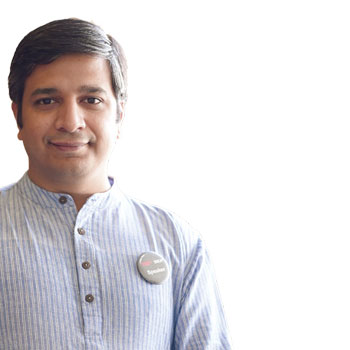
We have been talking a lot about Maya. Does Maya reside in warfare also? I think, it does. Technology has evolved over a period of time, but there have been inflection points. Nuclear fusion reaction was the greatest of all those inflection points, which affected both humanity and the warfare. The current inflection is Artificial Intelligence (AI) and in that Generative AI (GenAI), because it is changing warfare in a humungous way. The impact on warfare has in fact increased exponentially.
There is a race now going on between AI and human brain’s capability. Who is running this race? It is you and me. So, therefore, I am insisting on and on that it is you and me, who will decide the course of future. And, the impact of this particular race is that we may reach a point of similarity in terms of AI—similarity to the point where it will cross the human brain. You can imagine what will happen if that kind of situation occurs. Possibly, they may start controlling us.
The good part of AI—there are organisations and enterprises working towards making AI trustworthy, more productive and more effective. But, the bad part is that GenAI has created problems galore for us—it is percolating into every part of our society and also warfare.
What is happening in Israel-Hamas and Russia-Ukraine wars? These technologies are creating a team of humans, robotics and AI, all three clubbed into each other and creating a magnified effect on the battlefield.
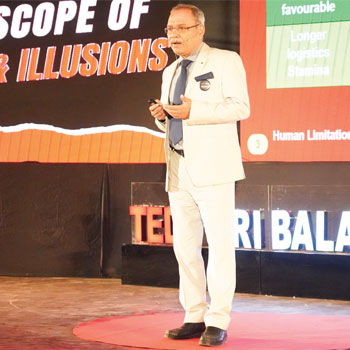
What is the growth trajectory of AI in future? If you fuse AI with quantum computing, the exponential rise of AI will take place and this would result in possibly AI superseding or crossing the human intelligence in selected field. This may lead to humans becoming second intelligent species in the world. And, if that happens possibly in future, you might find there would be a society, which would be created of humans, humanoid, robotics, all living together with different sets of cultural values and with different sets of rules of warfare.
In an ideal situation AI grows harmoniously with human beings, controlling and regulating the AI path. In bad scenario, AI is unregulated—if it goes uncontrolled in this direction. AI requires lot of power, GPUs and space to manufacture. Power sources also require space to manufacture. They will actually start impinging on the arable land of human beings. What will happen to the humans? That is the kind of future you might see if you do not regulate AI.